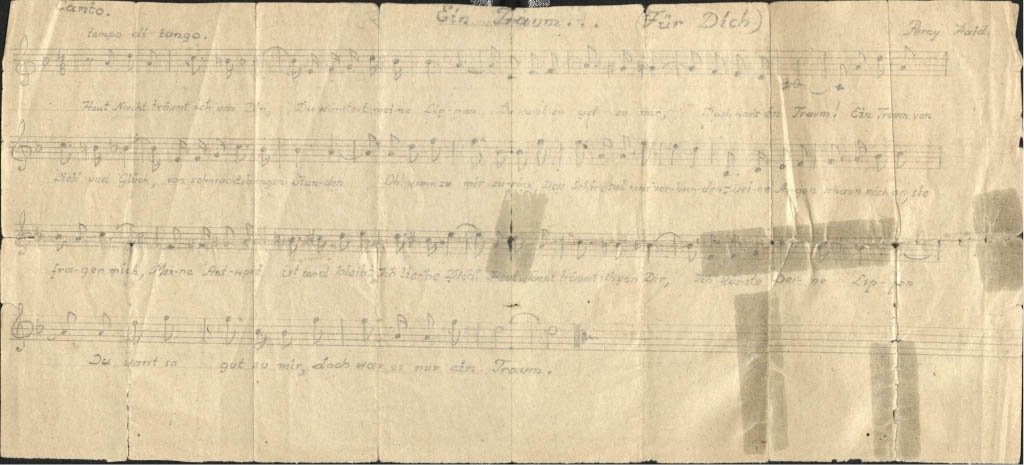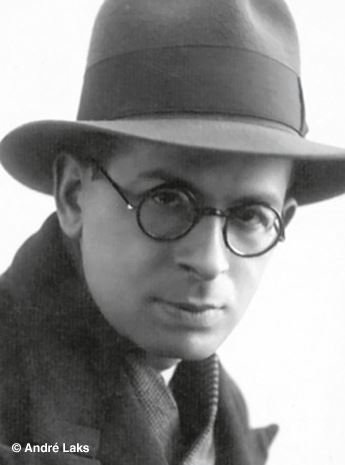
Featured Composers
Explore additional information about the composers featured in the Shoah Songbook Parts One-Three. Click here to learn more and to watch Likht Ensemble’s previous concerts.
Abraham Brudno (-1944)
Abraham Brudno, who died in the Klooga concentration camp, is primarily remembered for two songs composed in the Vilna ghetto in Lithuania: “Unter Dayn Vayse Stern” (Under Your White Stars) and ”Friling” (Spring). The latter is an example of the Yiddish tango tradition with a text by poet Shmerke Kaczerginski, in which he pleads with Spring to remove his grief after the death of his wife. It has been performed frequently, and may be heard in a historic recording by the poet himself on yadvashem.org.
Edwin Geist (1902-1942)
Little is known about Edwin Geist’s (1902-1942) early life and musical training in Germany. In 1938-9, after being banned from composing in his native country because he was half-Jewish, he relocated to Lithuania and married pianist Lyda Bagriansky. As conditions deteriorated there, they were interred in the Kovno ghetto and he was ultimately shot after a thwarted escape scheme. Many of his works survive in manuscript form thanks to violinist Vladas Varčikas, who broke into the couple’s apartment to collect the scattered papers after Lyda’s suicide.
Percy Haid (1913, Riga - 1977)
Courtesy of The United States Memorial Holocaust Museum: Percy Haid (1913, Riga - 1977) performed and arranged music for the [Kovno] Ghetto Orchestra, and played piano and accordion at the ghetto's "coffee house," the Cafe Monika. His original song "Mamele" (The Old Mother), written in the wake of a Kinderaktion, became widely known in Kovno and other locales; his symphonic poem, Fantasie in Gelb (Fantasy in Yellow), sketched out in Kovno and reworked in Dachau, was broadcast over German radio soon after liberation. Haid met his future wife Sonja Pessin while in Dachau; they arrived in the US in 1947 and settled in Chicago, where Haid relaunched his musical career. He is perhaps best known as the composer of the hit song "I Remember When," recorded by Eddie Fisher in 1952.
Mordechai Gebirtig (1877-1942)
Mordechai Gebirtig was a legendary Yiddish songwriter and poet described by a colleague as “the one and only troubadour of the Jewish street in Poland” and “the poet laureate of Yiddish folklore.” A self-taught musician and (impoverished) carpenter by trade, his songs quietly attained a classic status amongst European Jewry and have remained cornerstones of Yiddish folk music since his death from a Nazi bullet.
Miriam Harel (b. 1924)
Miriam Harel was a daughter of a large and cultured Polish-Jewish family who were sent to the Lodz ghetto in 1940. The teenaged Harel bore witness to her experiences there by writing songs - often assigning brutally realistic new lyrics to traditional Polish or Yiddish folk melodies. She survived the war and emigrated to Palestine where she worked as a writer and translator. She may be heard singing her own songs acapella at: https://holocaustmusic.ort.org/places/ghettos/lodz/
Gideon Klein (1919-1945)
In his short life, he composed approximately twenty-five original works and ten arrangements, and explored a wide variety of musical styles ranging from settings Hebrew folk melodies to avant-garde modernism. A driving force of Terezín's musical scene, Klein served as repetiteur for the infamous Terezín Verdi Requiem and played numerous recitals of solo and chamber music. He also spent much of his time teaching music to the camp's orphans. Ukolebavka was first performed in the winter of 1943. A folk song with Hebrew text, the melody is considered a nigun (a Jewish religious tune), which later evolved into a popular song. Klein was deported to Auschwitz in October 1944 and then to Fürstengrube. His legacy was preserved by several musicians, including his sister, Eliška Kleinová.
Karel Švenk (1907-1945)
Karel Švenk was an actor, director, writer, and composer. His popular productions of cabarets and variety shows made him a leading cultural figure within Terezín. Švenk teamed up with pianist/conductor Rafael Schachterto create an all-male cabaret, The Lost Rations Ticket, for one of the ghetto's nazi-sactioned performance showcases, or Kameradschaftsabende (Evenings of Fellowship). The show's final march, "Vsechno jde!" ("Anything Goes!") became a de facto anthem amongst prisoners, juxtaposing the harsh realities of life in the camp with hope for liberation and a brighter future. Švenk was eventually killed during a death march from Kraslice to Mauthausen in April 1945.
Simon (Szymon) Laks (1901-1983)
Simon (Szymon) Laks was a Polish composer, polymath and survivor of Auschwitz. After studying mathematics in Vilnius, he lived as a musician of many stripes in Vienna and then Paris before being deported to Auschwitz in 1942. There he served as conductor of the Auschwitz orchestra. After the war, he recounted his experiences in the book Mélodies d’Auschwitz, and argued that music in the camp was not an act of resistance, but a supplementary weapon used by Nazis to demoralize their prisoners. He continued to compose until his death.
Viktor Ullmann (1898-1944)
Viktor Ullmann was a prolific composer of opera, orchestral works, instrumental chamber music, and art song. A student of Arnold Schoenberg and a conducting assistant to Alexander Zemlinsky, his pieces are marked by both atonality and dissonant harmony, depth of expression, and mastery of formal structure. Ullmann was deported to Terezín in 1942, and based on his pre-war renown was asked to occupy himself with music, serving as a concert organiser, lecturer, critic, and assistant conductor. Ullmann was deported to Auschwitz in 1944 where he was killed in the gas chamber. Prior to leaving Terezín, he left his works in the safekeeping of philosopher Emil Utitz.
"I have written quite a lot of new music in Theresienstadt: it must be underlined...that we do not merely sit on the banks of the waters of Babylon, and that our endeavour with respect for arts was commensurate with our will to live." (Viktor Ullmann)
Mark Warshawsky (1848-1907)
Mark Warshawsky (1848 - 1907) was a writer of Yiddish song. Born in Odessa, he trained and worked as a lawyer, performing music only privately amongst friends. In 1890, he met the great writer Shalom Aleichem, who supported him artistically and provided the forward to his published collection Yiddishe Volkslider (Yiddish Folk Songs). Many of the pieces in this volume achieved a classic status in pre-war Europe, and none more so than the nursery rhyme “Oyfn Pripetchik.”
Ilse Weber (1903-1944)
Ilse Weber was a Czech-Jewish poet, songwriter, children's author, and radio producer. She learned to play guitar, lute, mandolin, and balalaika, but never pursued a career as a musician. She and her husband managed to send one of their sons, Hanuš, to London on a Kindertransport, before being deported to Terezín with their other son Tommy in 1942. While working as a night nurse in the children's ward of the ghetto infirmary, she secretly wrote poems and songs for her young patients, accompanying herself on a smuggled guitar. Weber was voluntarily transported to Auschwitz in 1944 with the children of Terezín and killed in the gas chambers along with her son. Her husband, Willi, buried her poetry, letters, and music in the Terezín gardens, which he dug up after the war.










